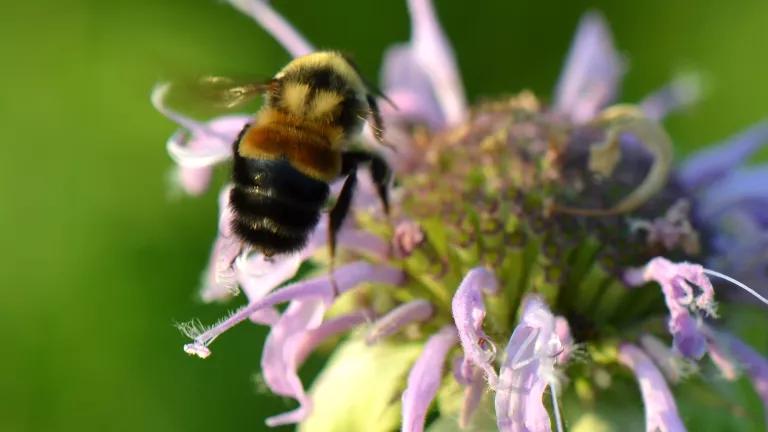Crisis to Opportunity: China Moves Fast to Protect Wildlife
In response to the COVID-19 crisis, China accelerated the pace of wildlife protection over the last year, which included the Standing Committee of the National People’s Congress adopting a decision to ban the trade of wildlife as food and to tighten its crackdown on illegal wildlife trade.
The Covid-19 crisis has prompted us to rethink the relationship between man and nature. Biodiversity protection, including wildlife, and public health issues are receiving increased attention around the world. In response, China accelerated the pace of wildlife protection over the last year, which included the Standing Committee of the National People’s Congress adopting a decision to ban the trade of wildlife as food and to tighten its crackdown on illegal wildlife trade (“Decision”).
To support the China National Forestry and Grassland Administration (NFGA), the country’s key agency for wildlife protection and a key contributor to the wildlife-related law amendment process, and to explore effective ways to protect wildlife and safeguard public health through wildlife management, NRDC conducted a policy review on global wild meat trade management and epidemic control practices. NRDC also assisted NFGA in the national policy development process by providing recommendations on amendments to the Wildlife Protection Law, such as expanding the scope of animals protected by the law beyond wildlife that is simply “rare or endangered”, and by making further recommendations to the revised draft from the People’s Congress during the public comment period. This included establishing a scientific and transparent wildlife stockpile management system in the revised draft for confiscated wild animals and their products.
In addition, NRDC jointly launched a Workshop Series on China Wildlife Law and Governance with partners in March 2021. This series aims to create a professional platform for experts to exchange views and provide both legal and regulatory recommendations to policy makers on wildlife protections. At the recent launch event, which was also the first event of this series, officials and experts reviewed the 2020 wildlife law and discussed the state of policy development on wildlife issues in China. In addition to the above-mentioned Decision, the following are some of the actions China has taken on wildlife trade in the last year:
- Completion of the revision of the "Animal Epidemic Prevention Law"1
- Initiation of the revision of the "Wild Animal Protection Law"2
- Addition of over 500 wildlife species to the “National Protected Species List” which is an appendix to the Wildlife Protection Law, including the Pangolin and Yangtze Finless Porpoise
- Introduction of a10-year fishing ban in the Yangtze river3
- Addition of three new wildlife-related crimes to the "Criminal Law Amendment" : illegal hunting, purchasing, transporting, and selling of terrestrial wildlife; destroying natural reserves; and illegally introducing, releasing, and discarding invasive alien species
- Strengthening wildlife law enforcement and market supervision, including the Cyber Sword operation which investigated online social platforms such as Weibo, WeChat, and video sites and crackdown on posts that feature illegal hunting, or the killing and abuse of wild animals, and videos or live broadcasts that feature wildlife products
- Provision of full government attention and financial support to the 140,000 poor people from disadvantaged groups impacted by the recent curtailing of the wildlife farming business. More than 90% of the compensation to those farmers was completed4
Rapid policy progress has been made on wildlife protection in the past year, but challenges remain, such as livelihood transformation for the farmers previously involved in the edible wildlife breeding business. An important example comes from the case of the Bamboo rat, the trade of which was banned after the Covid-195 outbreak last year. Licensed bamboo rat breeding was once a rural poverty alleviation project vigorously promoted by local governments such as those in Guizhou Province. It was estimated that 100,000 people in Guangxi were engaged in the Bamboo rat breeding business, which produced an output value of 2 billion yuan6. After the Decision was made, the Ministry of Agriculture and Rural Affairs announced a list of approved captive breeding wildlife. Bamboo rats was not listed, so the entire business came to an end.
Professor Qin Tianbao, the head of the Research Institute of Environmental Law at Wuhan University, pointed out at the recent NRDC Wildlife Law and Governance Workshop that, “The formulation of a law is science-based with a balance to the different interest groups. If one should be given priority to replace or even sacrifice the other, a reasonable mechanism needs be designed to compensate for the latter.” As we rethink our relationship with nature, we should keep this balance in mind. We must end activities destructive to wildlife and harmful to human health, while providing impacted peoples a transition to other activities that improve ecological conservation for greater harmony between people and nature.
The Wildlife Protection Law revision remains in the legislative process. It is our hope that future discussions in NRDC’s “Wildlife Protection Law and Governance” workshop series will generate collective wisdom and important insights for the final amendment.
1. Global Times: January 25, 2021 Amended Animal Epidemic Control Law Bans Slaughtering of Livestock in Markets https://www.globaltimes.cn/page/202101/1213801.shtml
2. Xinhua News Agency: February 12,2020 China Focus: Stay away from wild animals, China takes sustained action against illegal wildlife trade http://www.xinhuanet.com/english/2020-02/12/c_138777165.htm
3. Xinhua News Agency: January 02, 2021 China Focus: Ten-year Fishing Ban Begins in Yangtze River http://www.xinhuanet.com/english/2021-01/02/c_139635401.htm
4. Renmin Daily: December 01, 2020 National Forestry and Grass Administration: Compensation work for fasting wild animal farmers has been completed by more than 90% http://env.people.com.cn/n1/2020/1201/c1010-31951122.html
5. China Daily: October 12, 2020 Captive breeding of 45 wild animals to be phased out https://www.chinadaily.com.cn/a/202010/12/WS5f83ab40a31024ad0ba7df85.ht…
6. China News: April 06, 2020 18 million bamboo rats sentenced to death with a suspended death sentence: the livelihoods of 100,000 farmers and 2 billion yuan in business https://www.chinanews.com/cj/2020/04-06/9148704.shtml originally from China News Weekly April 06, Vol 942




